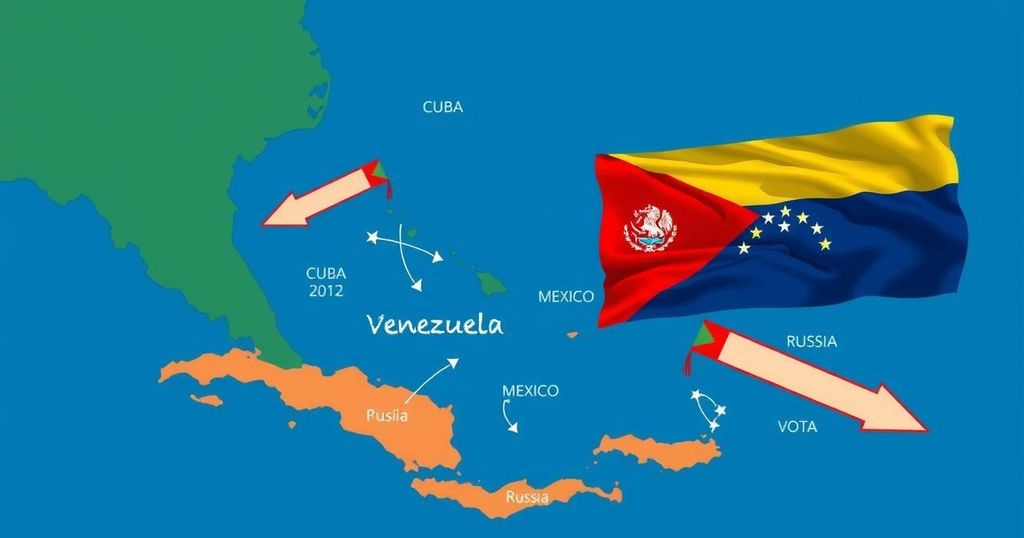Mexico has increasingly supported Cuba’s dictatorship, following Venezuela’s decline in aid due to its own crises. This support includes substantial oil shipments and food resources despite the dire state of Mexico’s internal issues, raising concerns about the government’s prioritization of a foreign dictatorship over its citizens’ welfare. Furthermore, Mexico’s lack of conditions for aid indicates a troubling disregard for the human rights situation in Cuba, potentially undermining its democratic values.
Mexico has emerged as a significant supporter of Cuba’s communist regime, joining the ranks of Russia and Venezuela in providing assistance to the Island nation. Historically, Cuba relied heavily on the Soviet Union for over $29 billion in resources, followed by Venezuela’s $35 billion in oil support during Hugo Chavez’s rule. With Venezuela currently faced with its own severe socio-economic turmoil, Mexico has stepped in to fill this void by sending vital resources to Cuba, including food and oil, purportedly to assist the longest-standing dictatorship in the Americas. Nevertheless, this support appears futile with the Cuban economy struggling under an oppressive regime that has not conducted elections for 65 years and holds approximately 1,100 political prisoners. Mexico’s diplomatic engagement with Cuba has garnered criticism, particularly for its stance on the migration crisis in the U.S., which Mexico leveraged to demand dialogues with Cuba. Furthermore, Mexico’s president, Claudia Sheinbaum, has displayed a troubling priority on aiding Cuba, amidst her own country’s spike in violence and chaos, which includes recent incidents of bombings and murders. In 2023, then-President Andrés Manuel López Obrador pledged a substantial amount of oil to Cuba, highlighting what appears to be an imprudent solidarity with a regime notorious for human rights abuses and failed governance. Despite the severe economic challenges facing Mexico, it has become Cuba’s second-largest oil supplier, surpassing that of Russia’s and potentially Venezuela’s, reflecting a troubling trend that further isolates the Cuban people while reinforcing a dictatorial regime. The dire state of Mexico’s support for Cuba is especially concerning given the context of the deterioration of democratic institutions within Mexico. The government has enacted measures that undermine transparency and judicial independence, further indicating a shift away from democratic principles. The blanket support for Cuba raises significant questions regarding the impact on Mexican citizens, who suffer from issues such as rolling blackouts similar to those seen in the failing Venezuelan economy. If Mexico were genuinely committed to the welfare of the Cuban populace, it would condition aid on the release of political prisoners and an end to systematic abuses within Cuba. Sadly, the current trajectory reveals a troubling complicity with a regime characterized by systemic oppression, which ultimately serves to bolster dictatorships in the region.
The historical relationship between Cuba and its supporters, notably the Soviet Union and Venezuela, underscores a long-standing trend of financial and political aid provided to sustain the Cuban regime. The economic struggles Cuba faces today are exacerbated by neglect in governance, cycles of repression, and a lack of international support stemming from political realities in the region. As a neighbor and a crucial trading partner of the U.S., Mexico’s recent diplomatic moves towards Cuba signal a shift in priorities and raise questions about the implications for both nations during times of political unrest and economic challenges. President Claudia Sheinbaum’s administration is particularly noted for prioritizing relations with Cuba over addressing pressing domestic issues, such as increasing violence and the economy.
In conclusion, Mexico’s recent actions in support of Cuba’s dictatorship raise significant ethical and political dilemmas regarding its commitment to democratic values. The collaboration appears to prioritize solidarity with a failing regime over the welfare of the Cuban people and the integrity of Mexico itself. Continuous support without conditions may undermine Mexico’s democracy and intensify the plight of the Cuban populace. Without significant changes, the implications of this alliance may resonate negatively throughout both nations for years to come.
Original Source: thehill.com






